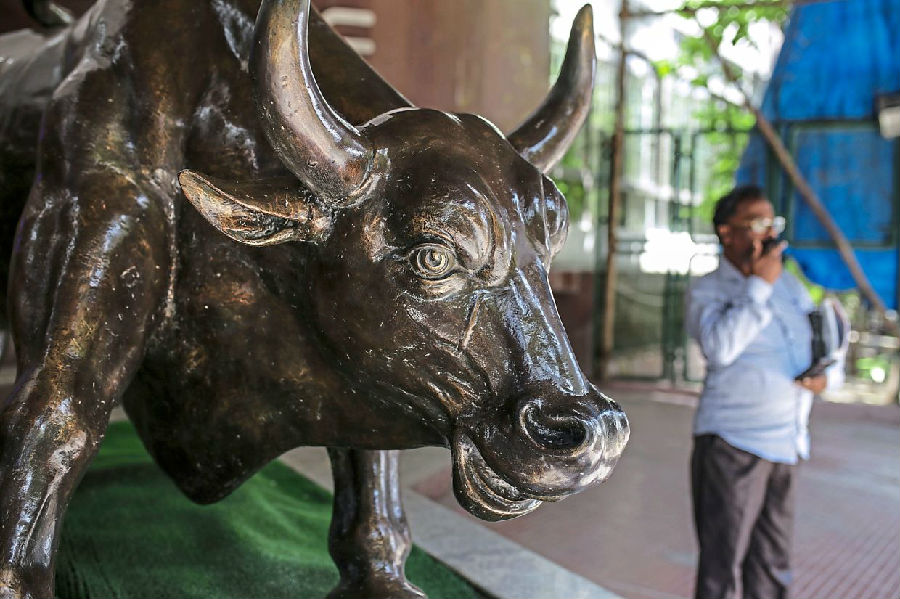For a chorus of the leading voices in investing, it was the monster rally whose time had come.
對于投資界的領軍人物而言,大牛市的時代已經到來。
For about five years, a group of sages, including value-investing boldface names Jeremy Grantham, Mark Mobius, and Rob Arnott,
在大約五年的時間里,包括價值投資界知名人物Jeremy Grantham、Mark Mobius以及Rob Arnott在內的
kept pronouncing that shares of companies in emerging markets offered the world's rarest blend of attractions:
一群大佬一直宣稱,新興市場中的公司股票具備世界上最罕見的吸引力:
deep-discount prices compared with U.S. equities, cheap currencies,
與美國股市相比,其價格大幅折讓、貨幣貶值,
and the prospect of robust growth driven by a burgeoning population of youthful middle-class workers and consumers—
以及由不斷增長的新興中產階級和消費者驅動的強勁增長的前景——
all factors that long promised a powerful comeback in the beaten-down sector.
長期以來,所有這些因素都預示著這個不被看好的行業將強勢回歸。
Two years ago, their prophecies came true. Valuations in emerging markets—
兩年前,他們的預言成真。新興市場——
a group of some 25 countries defined by low but growing per capita incomes, rapid industrialization, and zigzagging currencies—took flight.
約有25個國家,其定義是人均收入低但仍在增長,工業化迅速,貨幣走勢曲折——的估值大幅上升。
In the 24 months beginning in late January 2016,
在自2016年1月起的24個月內,
shares in the benchmark MSCI emerging markets index surged 85%, beating the S&P 500 by 31 percentage points.
基準MSCI新興市場指數飆升85%,比標準普爾500指數高出31個百分點。

Despite the sprint, emerging markets looked as if they had plenty of room to run.
盡管經歷了沖刺期,但新興市場似乎還有充足的運作空間。
Not only did they still boast a lot more earnings per dollars paid for equities in the developed world,
他們不僅吹噓在發達國家,每一美元支付給股票的收益要高得多,
they also now benefited from what they had long lacked: surging optimism and powerful momentum.
而且現在還從長期或缺的東西中獲益:高漲的樂觀情緒以及強大的動力。
Then the revival suddenly collapsed. After peaking on Jan. 26, the MSCI dropped 22%, seven times the fall in the S&P 500,
然后復興突然崩塌。1月26日達到巔峰后,MSCI下跌22%,是標準普爾500指數跌幅的七倍,
crushed by negative news about a looming U.S. trade war with China and debt crises in Turkey and Argentina.
這是受到了即將爆發的中美貿易戰,以及土耳其和阿根廷債務危機等負面消息的影響。
But for investors rummaging for bargains, the drop is a gift.
但對于搜尋便宜貨的投資者來說,跌幅是一件禮物。
It has sent the gap in valuations between stocks in developed and developing countries back to near-record levels,
這使得發達和發展中國家股票之間的估值差距回到接近紀錄水平,
making the always-speculative index particularly attractive. As Arnott, chief of Research Affiliates,
讓這個總是投機的指數尤其具有吸引力。銳聯資產管理公司是一家為互惠基金
a firm that designs and manages indexes for mutual funds and ETFs, told Fortune: "Emerging markets are the buy of the decade."
和ETF設計和管理指數的一家公司,其負責人告訴《財富》:“新興市場是這十年最值得買入的。”
In a letter to clients, Grantham, cofounder of asset-management giant GMO, said he was putting half his family's retirement funds into the sector.
在致客戶的一封信中,資產管理巨頭GMO的聯合創始人Grantham表示,他將一半的家庭退休基金都投入了這個行業。
As for Mobius, a pioneer of emerging-markets investing who retired earlier in the year from Franklin Templeton Investments,
至于Mobius,他是新興市場投資的先驅,今年年初從富蘭克林鄧普頓投資公司退休,
he's raising more than $500 million to take advantage of what he calls the "phenomenal opportunity" caused by the recent turmoil in the sector.
他正在籌集5億多美元,以利用最近該行業動蕩帶來的“非凡機會”。
Emerging markets offer a classic high-risk, high-reward investment opportunity.
新興市場提供了一個經典的高風險、高回報的投資機會。
The countries that fit the description represent 40% of the world's economic output as measured by gross domestic product
按照國內生產總值衡量,符合描述的國家占世界經濟產出的40%,
but just 12% of global stock market value. The potential for high growth is associated with countries
但只占全球股市價值的12%。高增長的潛力與從嚴重依賴農業和原材料出口
moving rapidly from heavy dependence on agricultural and raw-materials exports into finished goods manufacturing and services.
迅速轉向制成品制造業和服務業的國家有關。
That said, higher growth prospects come with greater volatility, especially owing to high political, currency, and other risks.
但更高的增長前景伴隨著更大的波動性,特別是由于較高的政治、匯率和其他風險。
This explains the valuation/GDP mismatch, and it's also why emerging-markets investment strategies fall in and out of favor so frequently.
這就解釋了估值和GDP之間的錯誤搭配,也是新興市場投資策略頻繁起起落落的原因。
譯文由可可原創,僅供學習交流使用,未經許可請勿轉載。


